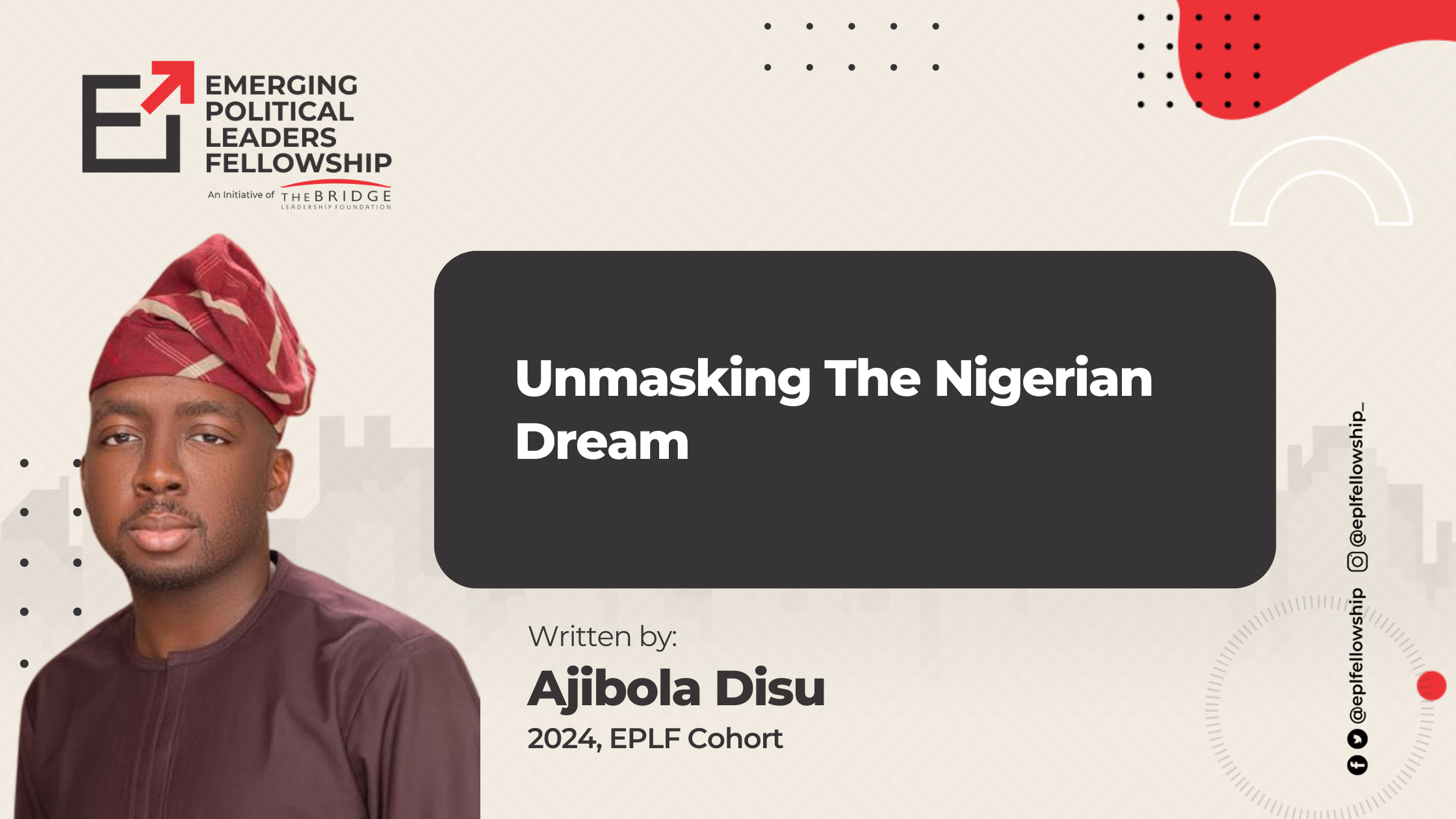An Article by Ajibola Disu, 2024 EPLF Cohort Fellow
The Nigerian Dream transcends individual ambition; it is a shared vision where every Nigerian, regardless of gender, tribe, religion, or socioeconomic background, has the opportunity to achieve their fullest potential. This dream goes beyond mere survival, it is about unleashing the boundless talent and innovation within every Nigerian, creating a society where excellence is the norm. Imagine a Nigeria where breakthroughs in medicine, agriculture, and manufacturing are commonplace. A nation where Nigerian inventors and innovators lead the world, and our citizens excel in international competitions across various human endeavours. This vision is not just about achieving global recognition but about significantly improving lives both within and beyond our borders.
The Nigerian Dream is also about a profound internal transformation. It calls for a resurgence of the core values that define Nigeria’s spirit: resilience, hard work, and a deep sense of community. These values are the foundation upon which this ambitious vision is built, reflecting who we are as Nigerians and guiding our journey toward greatness. The path to realizing this dream is fraught with challenges such as poverty, inequality, and infrastructure deficiencies. However, Nigerians are known for their resourcefulness and ability to overcome adversity. By ensuring access to quality education and healthcare for all, we can harness this indomitable spirit and clear the path to a brighter future.
The Nigerian Dream is not a utopian fantasy; it is a call to action. It is a beacon illuminating the way toward a future where every Nigerian child can dream big, knowing that with hard work and dedication, their dreams can become reality. It is a future where Nigeria stands tall on the world stage, not just as a nation rich in resources, but as a nation rich in the potential of its people. This dream is not a destination but a journey—a continuous striving toward a more perfect union. It begins with each Nigerian embracing the responsibility to contribute their unique talents and perspectives. It requires unity, collaboration, and a relentless pursuit of excellence. The journey to a better Nigeria starts now, with each of us playing our part in making this vision a reality.
Tribalism stands as a significant barrier to nation-building in Nigeria. It divides our national identity, prioritizes loyalty to tribes over the nation, and weakens the sense of shared purpose crucial for unity and progress. Tribal affiliations can influence political appointments and resource allocation, leading to corruption and inefficiency, and perpetuating social unrest and violence. Tribalism also has severe economic consequences. It can result in policies favoring certain groups, hindering equitable development, and creating an unstable environment that discourages investment. Businesses, especially small and medium-sized enterprises (SMEs), may struggle to access resources or markets due to tribal affiliations. Addressing tribalism is essential for creating a more fertile ground for economic growth and effective governance. Tackling tribalism requires effective policies that promote national unity, equitable resource distribution, and inclusive governance. By fostering a sense of shared identity and purpose, Nigeria can overcome the divisions that hinder progress and build a stronger, more unified nation.
To strengthen the economy, we must invest in human capital by improving access to quality education, particularly in STEM fields and vocational training, to create a more skilled workforce and boost entrepreneurship. Supporting small and medium-sized businesses is also crucial; we need to provide easier access to loans, grants, and mentorship programs to help SMEs grow and create jobs. Additionally, diversifying the economy is essential. We must reduce dependence on oil by promoting investment in agriculture, manufacturing, and the tech sector.
Overhauling national security requires police reform, investing in training and equipping the police force to improve professionalism and public trust. Community policing is also vital, increasing collaboration between police and communities to address local security concerns. Addressing the root causes of crime is equally important, focusing on programs that tackle poverty, unemployment, and inequality, which contribute to crime.
Developing public infrastructure involves investing in power generation and distribution to improve access to reliable and affordable electricity throughout the country. Upgrading transportation infrastructure, including roads, bridges, and public transportation systems, is necessary to connect people and goods more efficiently. Lastly, developing digital infrastructure by expanding access to affordable internet and technology will help bridge the digital divide. These initiatives are starting points for transforming Nigeria into a more prosperous, secure, and inclusive society. Each initiative requires specific solutions tailored to Nigeria’s unique context, but together, they can lay the foundation for achieving the Nigerian Dream.


Comment (1)
wow, wow, this is one of the best piece I have ever come across in 2024.
keep up.
Comments are closed.